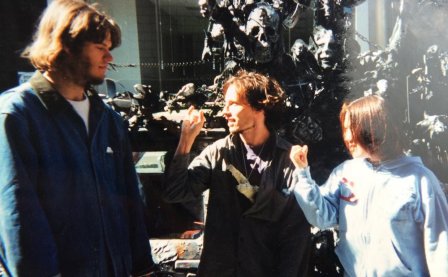Sorry Bono, but if I can just be honest here for a second: Ramones nostalgia makes me wanna sniff some glue, straight up. Mostly because, in my opinion, I don’t think that they wrote very “miraculous” songs, but also, on a base rhetorical-political (and thus necessarily personal) level, I can’t get over how much they are often historically heralded as champions of both rebellion and stagnancy, retroactively lauded as brilliant innovators amongst punk fans and as economical conservationists amongst those a bit more suspicious of their staying power. This pervasive defensiveness for why Ramones should remain relevant not only in our collective memory, but also in our history books has always been a turn-off for me since I found myself underwhelmed by “Blitzkreig Bop” as a 13 year old sifting for a means of incineration, not sedation. (I would later discover that Fugazi was much better at all of that shit anyway).
Now, I realize how whiny and overwrought this all sounds, and I’m sincerely sorry that I am being so eviscerating of a band that I’m not even covering in this review. This kind of “reflection” on rock music’s history and its encompassing rhetoric, however, is an issue that is spurtedly unearthed on Deerhoof’s 12th full-length record, La Isla Bonita, and part of uncovering its stylistic and performative context requires gazing through a historical-critical lens at punk’s sinewy roots. So, bear with la’ narrative for a bit, yeah? Where was I?
Flash forward. 2007. Second semester of my freshman year of high school. A friend makes me a mixtape that contains songs from Deerhoof’s brand new album, Friend Opportunity. I am floored by how densely packed with pure inventive energy it is. Its songs not much longer than Ramones’ songs, Friend Opportunity proved in my mind at the time that this aggressive micro-song format could actually be sublimely affective, fun, and substantive: these brief songs weren’t legs in a race; they were carefully framed and adroitly captured bursts of inertia. As I rummaged through Deerhoof’s back catalogue, it became clear that John, Satomi, and Greg (Ed joining later) weren’t just compressing jazz and noise movements into tinier units of time, they were riffling through their abundant and original ideas like they were all taking a Rorschach test simultaneously. Furthermore, heavier and more immersive cuts from early records such as Reveille, Apple O’, and The Runner’s Four exhibit that Deerhoof as a unit is as fundamentally driven by experimentation as it is exploration, its sonic pulses intricately and swiftly graphing days and nights spent running through forests, nature’s brassy sounds abound.
Following 2012’s blown-out dance-pop-tinged Breakup Songs, La Isla Bonita signals a formic returnal for a band known mostly for completely castrating genre signifiers. In other words, La Isla Bonita is a crack back at that old, prophetic drawing board that Deerhoof had spent most of its career symbolically lighting on fire. Exhibit A: opener “Paradise Girls” is a skeleton of a song constructed of muted electric guitar strums, typically syncopated drum fills, and a catchy, spiraling vocal melody from Satomi: a Deerhoof song dissected and played back like that Benjamin Britten suite in Moonrise Kingdom. This stitched-together approach works exceptionally well when each individual part aligns in either structured cacophony like on lead single “Exit Only” or impressionistic counterpoint like on “Black Pitch.” While this whittled-back move makes each alien-sounding bell and shrill whistle stick out like a splinter (in a viscerally good way), overall, La Isla Bonita feels crumbly and thin: “Mirror Monster” is Deerhoof’s reductionist take on contemporary Americana à la War on Drugs; “Doom” feels like a hollowed-out version of “The Perfect Me” from Friend Opportunity; and “Tiny Bubbles” is tinny pop groove that snags more than it moves.
So, what does this record say, then (however implicitly), about our storied relationships with our favorite music? Is this what Deerhoof really sounded like before, gutted inside and hardened outside? Or is Deerhoof playing off of a fabricated memory of attachment, of resonance? Is La Isla Bonita a metaphor for how unconditionally beautiful we remember formerly and fondly inhabited spaces? Is its doom-y lyrical imagery amidst its upbeat melodies a warning sign against even its own attempts at chasing that nostalgia? That bit about Ramones (cited as a major influence on this record) was an attempt on my part at engaging with a history that is stubborn and one-sided; La Isla Bonita, at least sonically, is a thorny attempt at rekindling that original intensity that has inspired prolonged praise and searching for a particular kind of musical rupture. It’s not a bad record (and it certainly doesn’t follow that simplicity is bad); in fact, in a lot of ways it feels like Deerhoof’s most confident release yet, which is symptomatic of its central limitation. Unfortunately, instead of rebuilding a sound structure (double meaning intended) with those scattered shards that Deerhoof has violently shaved off over its career, with La Isla Bonita, they’ve traced a nominal new work from a picture that never existed in such an ostensibly neatly composed way. Without that compositional tension hanging in its margins though, La Isla Bonita’s expressions, however inciting, remain just out of grasping reach, like an island mirage.
More about: Deerhoof




